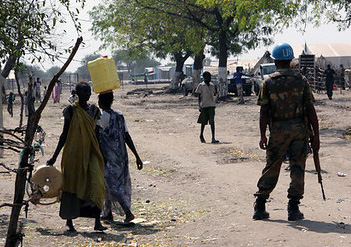
Recent waves of inter-communal violence, characterized by attacks on civilians and deliberate targeting of humanitarian outposts and services, have engulfed South Sudan’s Jonglei state, particularly around the town of Pibor. In Enough’s most recent paper, “Urgent Steps to Counter Inter-Communal Violence in South Sudan,” Jennifer Christian, Amanda Hsiao, and John Prendergast examine not only the most recent flare ups of violence between the Lou-Nuer and Murle ethnic groups in Jonglei state but also evaluate holistic steps the government of the Republic of South Sudan, or RSS, and the United Nations Mission in South Sudan, or UNMISS, must take in order to mitigate inter-communal tensions and violence broadly in South Sudan over the long-term.
The spate of violence highlights many of the governance and stability challenges facing South Sudan. The authors noted:
Most recently, inter-communal violence in Jonglei state has underscored, among other things, the weaknesses in South Sudan’s security and policing sectors. It has also brought to the fore underlying issues of a lack of accountability and political inclusion, as well as the breakdown of traditional authority structures, which collectively threaten to erode the fragile social and political stability of the new nation.
While inter-communal violence in Jonglei state particularly, and in South Sudan more generally, is cyclical in nature, it need not be inevitable. The report lays out the root causes for inter-communal violence in the world’s newest country and provides specific policy recommendations aimed at addressing the current situation as well as preventing future unrest.
Enough’s policy recommendations exist on a two-fold track: short-term initiatives aimed at mitigating the danger to civilians and fostering reconciliation processes and long-term initiatives focused on strengthening accountability mechanisms, development, civilian disarmament, and the creation of inclusive political structures. This approach deals with both the root and proximate causes of violence in South Sudan in a comprehensive manner.
Short-term initiatives:
- Strengthen inter-communal reconciliation efforts to bring the two communities into dialogue about accountability and compensation and to compel communities to refrain from violence as a means to address grievances. This should be led by the Sudan Council of Churches, the RSS, civil society, traditional community leaders and supported robustly by UNMISS and donor nations.
- Strengthen civilian protection efforts to ensure civilians are protected and begin taking immediate steps to strengthen the capacity of UNMISS, the SPLA, and the Southern Sudan Police Service.
Long-term initiatives:
- Achieve greater accountability for crimes committed in the context of inter-communal violence, which requires a strengthening of both traditional justice systems as well as state legal and judicial mechanisms.
- Strengthen efforts to bridge the divide between local communities and the state and national levels of government to provide greater inclusion of the Lou-Nuer and Murle communities in national political dialogues. Greater political inclusion of marginalized communities creates space for their concerns and grievances to be aired in a non-violent manner.
- Develop infrastructure, service delivery, and economic opportunities to decrease the desperation and isolation of armed Lou-Nuer and Murle youth.
- Prioritize future non-violent, community-engaged disarmament to increase stability between the two communities. The RSS should refrain from initiating such a disarmament campaign until confidence and goodwill has been cultivated between the two communities and the government, and security improves.
Read the full report: “Policy Brief: Urgent Steps to Counter Inter-Communal Violence in South Sudan.”
Photo: Pibor, Jonglei State, South Sudan: UN Peacekeepers were deployed to protect civilians in Pibor. In early January 2012, Luo-Nuer fighters withdrew froma a potentially major confrontation in the town after peacekeepers and government forces set up defensive positions (OCHA / Cecilia Attefors).

